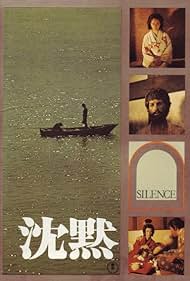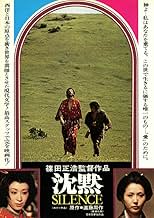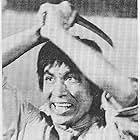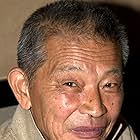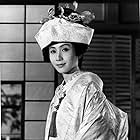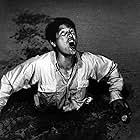Chinmoku
- 1971
- 2h 9m
IMDb RATING
7.1/10
1.2K
YOUR RATING
Two Jesuit priests encounter persecution when they travel to Japan in the 17th century to spread Christianity and to locate their mentor.Two Jesuit priests encounter persecution when they travel to Japan in the 17th century to spread Christianity and to locate their mentor.Two Jesuit priests encounter persecution when they travel to Japan in the 17th century to spread Christianity and to locate their mentor.
- Awards
- 4 wins & 2 nominations
Storyline
Did you know
- TriviaShusako Endo hated the ending of the film which the director changed against Endo's wishes.
- ConnectionsVersion of Silence (2016)
Featured review
Masahiro Shinoda's take on Shusaku Endo's most important novel is an artistically risky and bravely filtered effort. Ultimately, 1971's "Chinmoku" succeeds in being the definitive film adaptation of the source material.
On the other hand, Martin Scorsese's later adaptation, while visually stunning, can't hold a candle to "The Last Temptation of Christ"; his magnum opus when it comes to religious thematics. In the case of "Silence", Scorsese's approach is not indicative of a similar radical zeal compared to Shinoda's; an attitude that perhaps stems from a Catholic Christian's need to reconcile with his church after "The Last Temptation" caused a negative uproar among Christian fanatics. No one can blame him, as long as he decides to remain fairly faithful to the main core of the novel of a... Japanese Catholic. That said, the film comes across as much more one-sided and noticeably less provocative than Shinoda's.
For instance, the 2016 film makes an unnecessary effort to idealize the protagonist, whose character has much more moral gray areas as portrayed in the book. There's also a dedication to the numerous Jesuit martyrs in Japan when the end credits begin to fall.
On the contrary, in the impeccable Japanese production of 1971, the divine presence is never confirmed, while the cynical finale adds to the ambiguity of the film, also keeping the flame of interest alive on crucial themes, which are analyzed more adequately: The "western" motives of proselytizing missions (priests are reduced to blind soldiers of a culture war), the historical background and the circumstances that caused the Japanese authorities to prohibit Christianity and marked the opening of a bloody cycle of intolerance, and the dilemma of fulfilling a higher purpose at the cost of prolonging the torture of innocents.
On the other hand, Martin Scorsese's later adaptation, while visually stunning, can't hold a candle to "The Last Temptation of Christ"; his magnum opus when it comes to religious thematics. In the case of "Silence", Scorsese's approach is not indicative of a similar radical zeal compared to Shinoda's; an attitude that perhaps stems from a Catholic Christian's need to reconcile with his church after "The Last Temptation" caused a negative uproar among Christian fanatics. No one can blame him, as long as he decides to remain fairly faithful to the main core of the novel of a... Japanese Catholic. That said, the film comes across as much more one-sided and noticeably less provocative than Shinoda's.
For instance, the 2016 film makes an unnecessary effort to idealize the protagonist, whose character has much more moral gray areas as portrayed in the book. There's also a dedication to the numerous Jesuit martyrs in Japan when the end credits begin to fall.
On the contrary, in the impeccable Japanese production of 1971, the divine presence is never confirmed, while the cynical finale adds to the ambiguity of the film, also keeping the flame of interest alive on crucial themes, which are analyzed more adequately: The "western" motives of proselytizing missions (priests are reduced to blind soldiers of a culture war), the historical background and the circumstances that caused the Japanese authorities to prohibit Christianity and marked the opening of a bloody cycle of intolerance, and the dilemma of fulfilling a higher purpose at the cost of prolonging the torture of innocents.
- filmplanet_reviews
- Dec 9, 2023
- Permalink
- How long is Silence?Powered by Alexa
Details
- Runtime2 hours 9 minutes
- Sound mix
- Aspect ratio
- 1.33 : 1
Contribute to this page
Suggest an edit or add missing content

